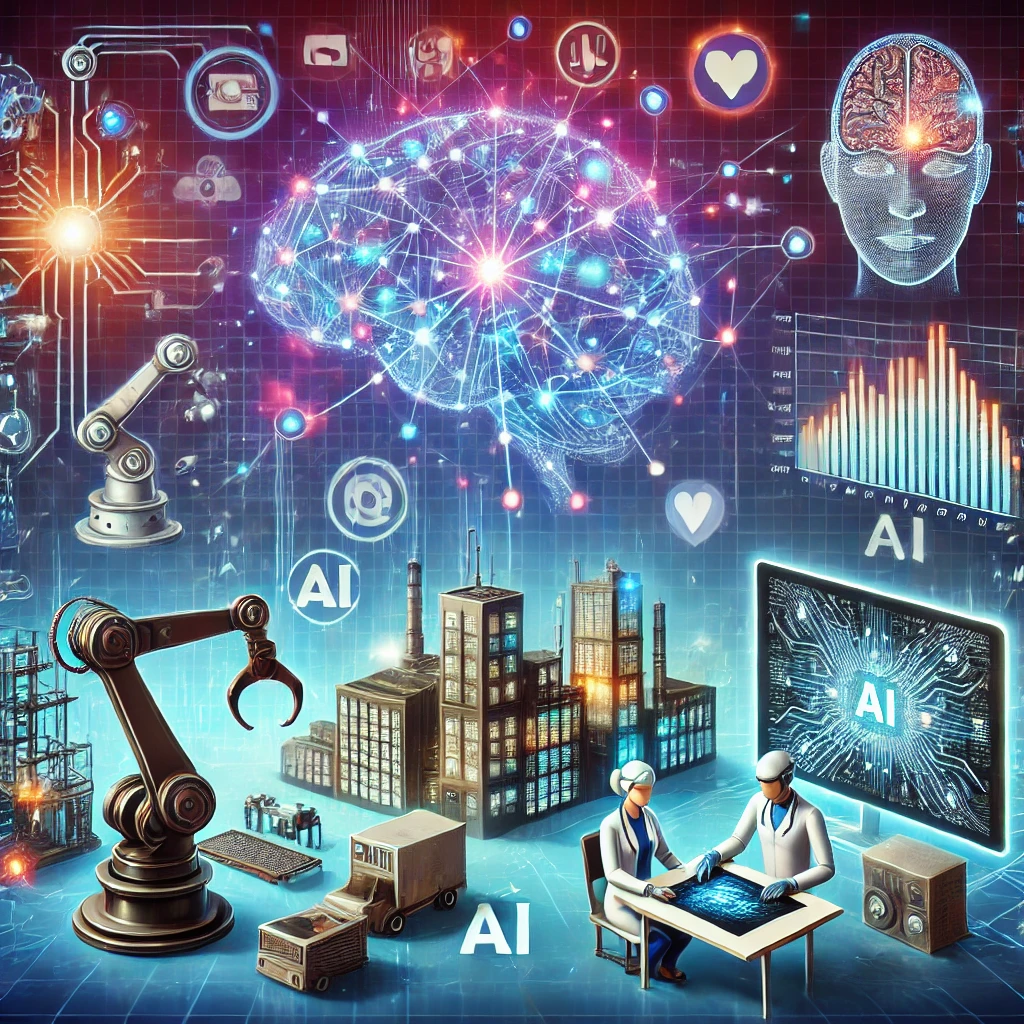Artificial Intelligence (AI) is no longer a concept of the future; it is a powerful force altering industries around the world. From healthcare and finance to manufacturing and entertainment, AI is sparking innovation, boosting efficiency, and creating new opportunities. As AI develops further, its applications are broadening, breaking barriers, and changing the landscape of various fields. This article delves into the present state of AI, its transformative effects on industries, and its potential for the future.
Understanding Artificial Intelligence
Artificial Intelligence involves creating machines that mimic human intelligence to perform tasks requiring cognitive functions like learning, reasoning, and decision-making. Key aspects of AI include:
- Machine Learning (ML): Algorithms that learn from data to make predictions or decisions.
- Natural Language Processing (NLP): Enabling machines to understand and generate human language.
- Computer Vision: AI systems that interpret and analyze visual data such as images and videos.
- Robotics: The integration of AI in physical devices to perform tasks autonomously.
AI’s flexibility and ability to handle vast amounts of data make it a revolutionary tool across various industries.
Industries Being Transformed by AI
1. Healthcare
AI is transforming healthcare by improving diagnostics, enhancing patient care, and speeding up research.
- Medical Imaging: AI tools analyze X-rays, MRIs, and CT scans with high accuracy, helping detect conditions like cancer early.
- Personalized Medicine: ML algorithms analyze genetic data to customize treatments for individual patients.
- Drug Discovery: AI cuts the time and expense of developing new drugs by simulating chemical interactions and identifying potential compounds.
- Virtual Health Assistants: Chatbots and AI-driven apps provide health advice, reminders, and support to patients.
2. Finance
In the financial sector, AI is automating processes, reducing fraud, and improving customer experiences.
- Fraud Detection: ML algorithms detect transaction anomalies to prevent fraud.
- Algorithmic Trading: AI executes trades based on data analysis, optimizing investment strategies.
- Risk Management: Predictive analytics assess creditworthiness and market risks.
- Customer Service: AI-powered chatbots help customers with account queries and financial planning.
3. Manufacturing
AI boosts productivity, quality, and safety in manufacturing.
- Predictive Maintenance: AI forecasts equipment failures, reducing downtime and repair costs.
- Quality Control: Computer vision systems identify product defects with high precision.
- Supply Chain Optimization: AI streamlines logistics, inventory management, and production planning.
- Robotics and Automation: AI-driven robots perform repetitive tasks, increasing efficiency and reducing human error.
4. Retail
AI is revolutionizing retail by personalizing customer experiences and optimizing operations.
- Personalized Recommendations: AI analyzes customer behavior to suggest products, enhancing the shopping experience.
- Inventory Management: Predictive analytics help retailers maintain optimal stock levels.
- Dynamic Pricing: Algorithms adjust prices based on demand, competition, and market conditions.
- Virtual Try-Ons: AI-powered AR technology allows customers to visualize products like clothing or furniture in real-time.
5. Transportation and Logistics
AI is driving change in transportation and supply chain management.
- Autonomous Vehicles: Self-driving cars and drones use AI to navigate, reducing accidents and enhancing efficiency.
- Route Optimization: AI-powered systems calculate the most efficient delivery routes.
- Fleet Management: Predictive analytics monitor vehicle performance, reducing operational costs.
Artificial Intelligence is reshaping numerous industries, and as it continues to evolve, its impact will only grow. The future possibilities of AI are vast, and its role in driving innovation and efficiency across various sectors is undeniable.
Smart Traffic Management AI systems analyze traffic patterns to reduce congestion.
Entertainment
The entertainment industry uses AI to make content more engaging and personalized.
- Content Recommendations: Services like Netflix and Spotify recommend shows, movies, and music based on what users like.
- Content Creation: AI is used to make music, art, and even scripts, opening up new creative possibilities.
- Gaming: AI improves the behavior of non-player characters (NPCs), making games more immersive.
- Audience Analytics: AI looks at viewership data to help with marketing and content production.
The Future of AI in Industries
As AI technology advances, it will bring major changes to various sectors:
- Ethical AI Developing ethical AI frameworks will ensure these systems are transparent, fair, and accountable, addressing concerns about bias and misuse.
- Human-AI Collaboration AI will increasingly work alongside humans, taking over repetitive tasks while people focus on strategic and creative roles.
- AI-Powered Sustainability AI will help optimize energy use, reduce waste, and enable smarter urban planning, driving sustainability efforts.
- Advanced Personalization Future AI systems will offer highly personalized experiences in healthcare, retail, and entertainment, leading to better customer satisfaction and outcomes.
- Quantum AI Combining quantum computing with AI will tackle complex problems in areas like cryptography, material science, and climate modeling.
Challenges and Considerations
While AI holds great promise, its adoption comes with challenges:
- Data Privacy: It is crucial to ensure personal data is used ethically.
- Job Displacement: Automation might lead to job losses, requiring initiatives for upskilling and reskilling.
- Bias and Fairness: AI systems need to be designed to minimize bias and promote inclusivity.
- Regulation: Governments and organizations need to create effective frameworks to regulate AI.
Conclusion
Artificial Intelligence is more than a tool for efficiency; it is a transformative force reshaping industries, driving innovation, and creating new opportunities. As AI evolves, its impact will go beyond automation, influencing the future of work, healthcare, entertainment, and more. By addressing challenges and promoting ethical development, society can fully harness AI’s potential, ensuring a future where technology serves humanity in unprecedented ways.
